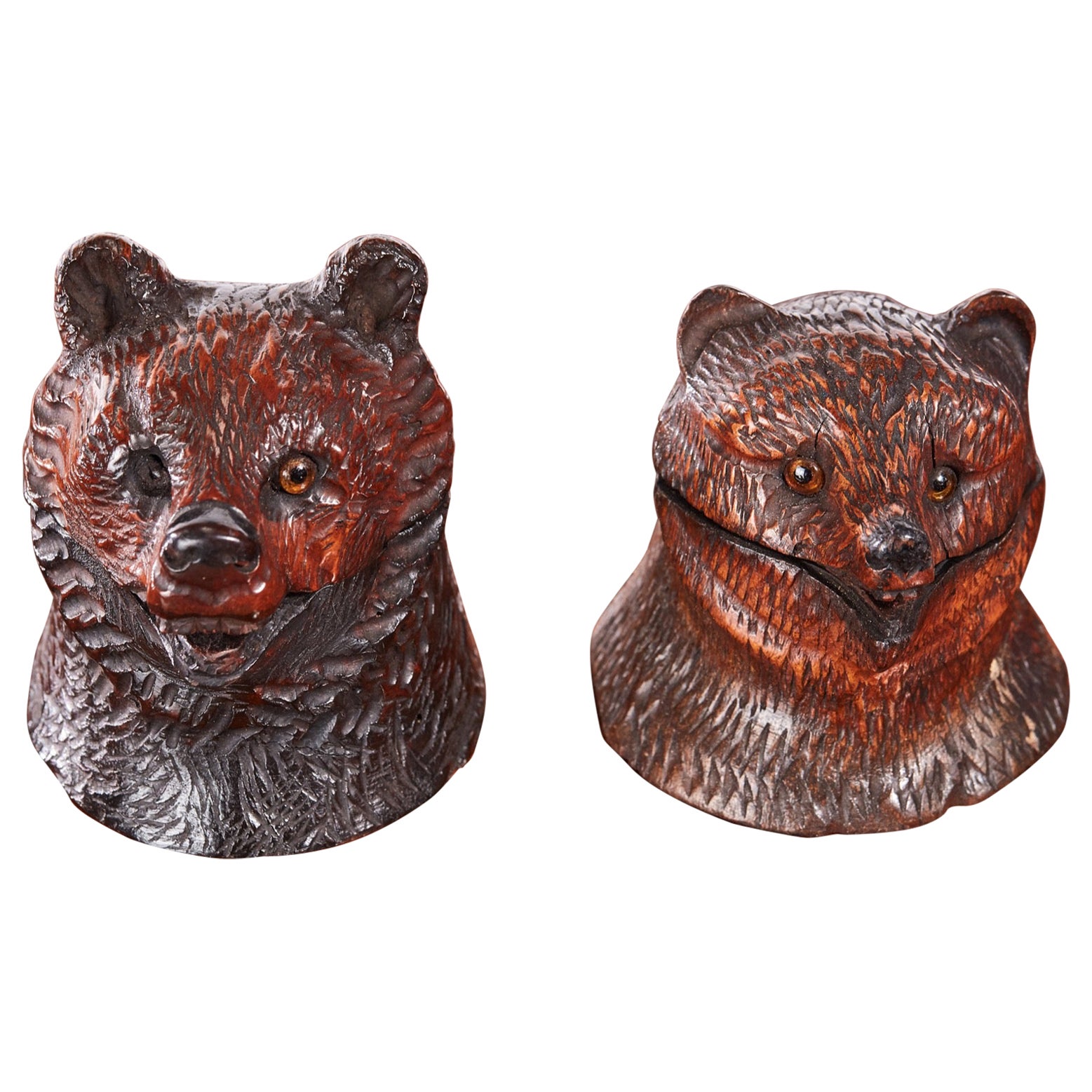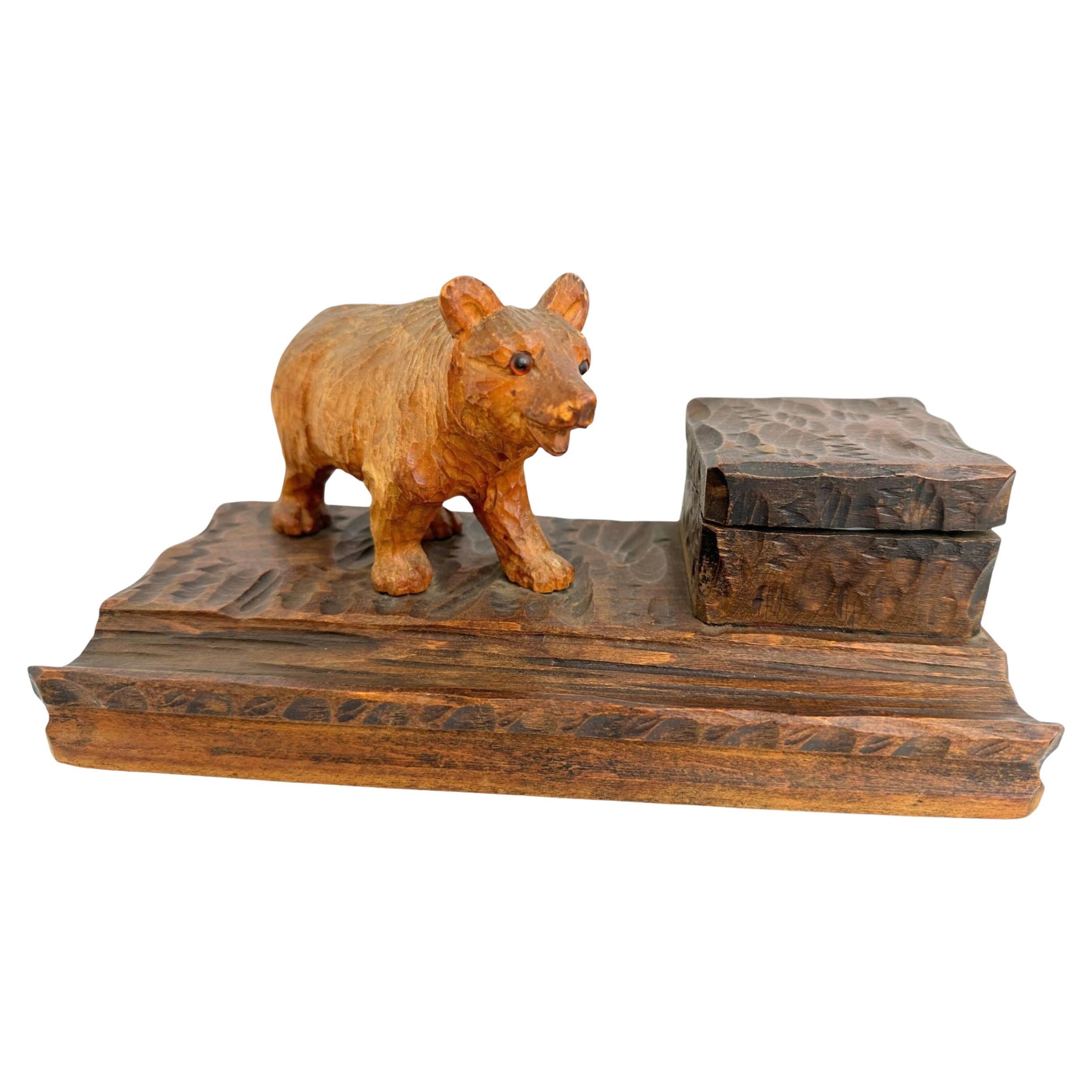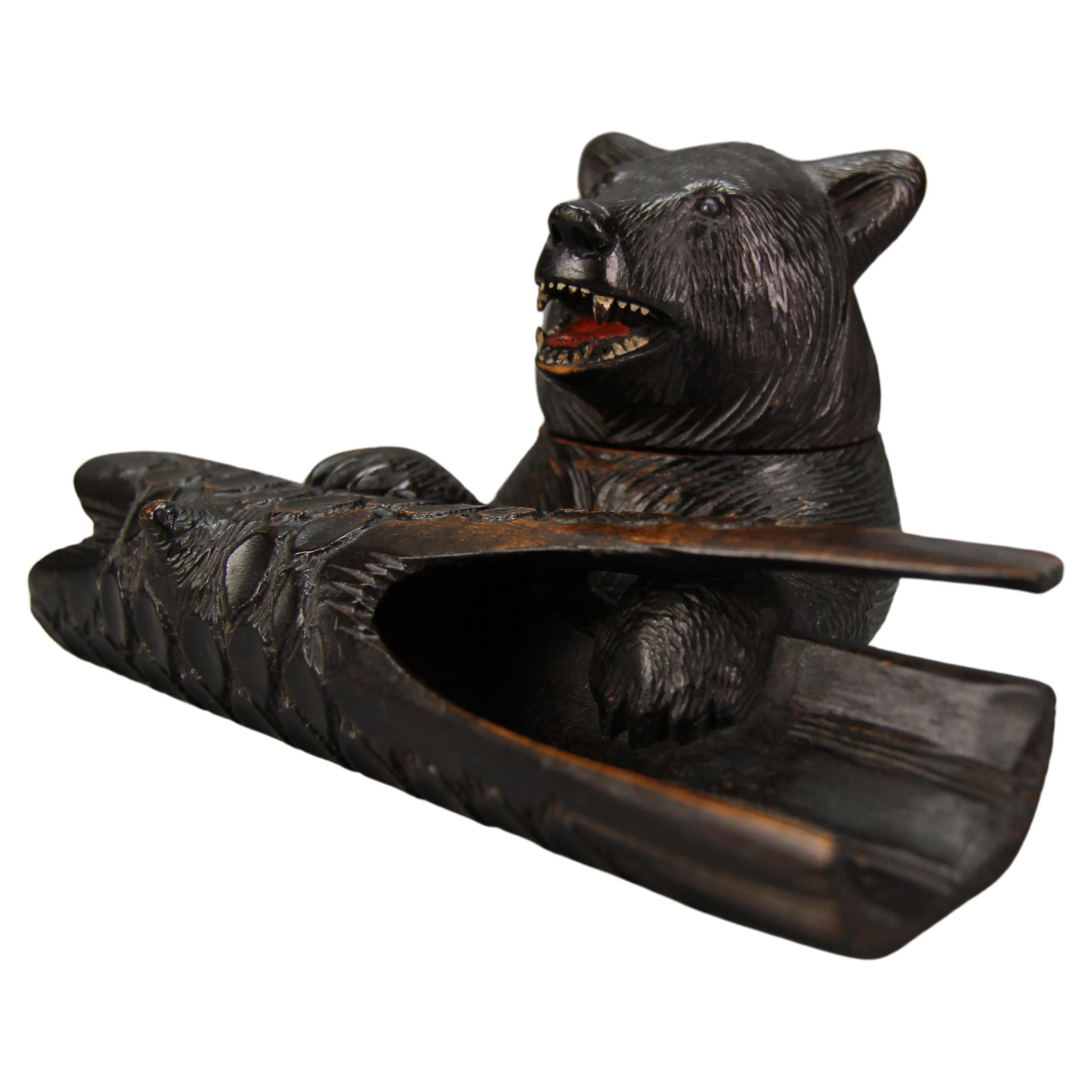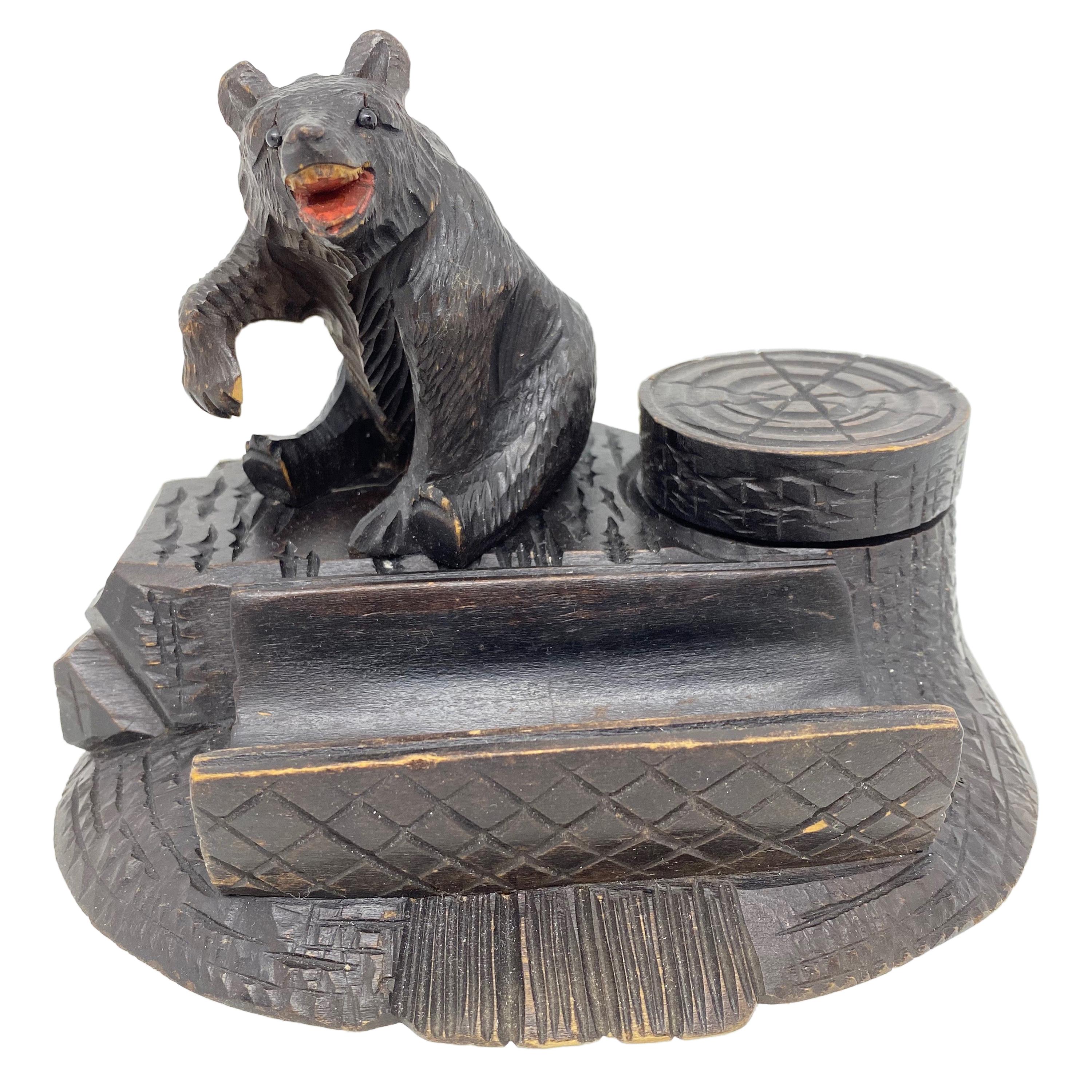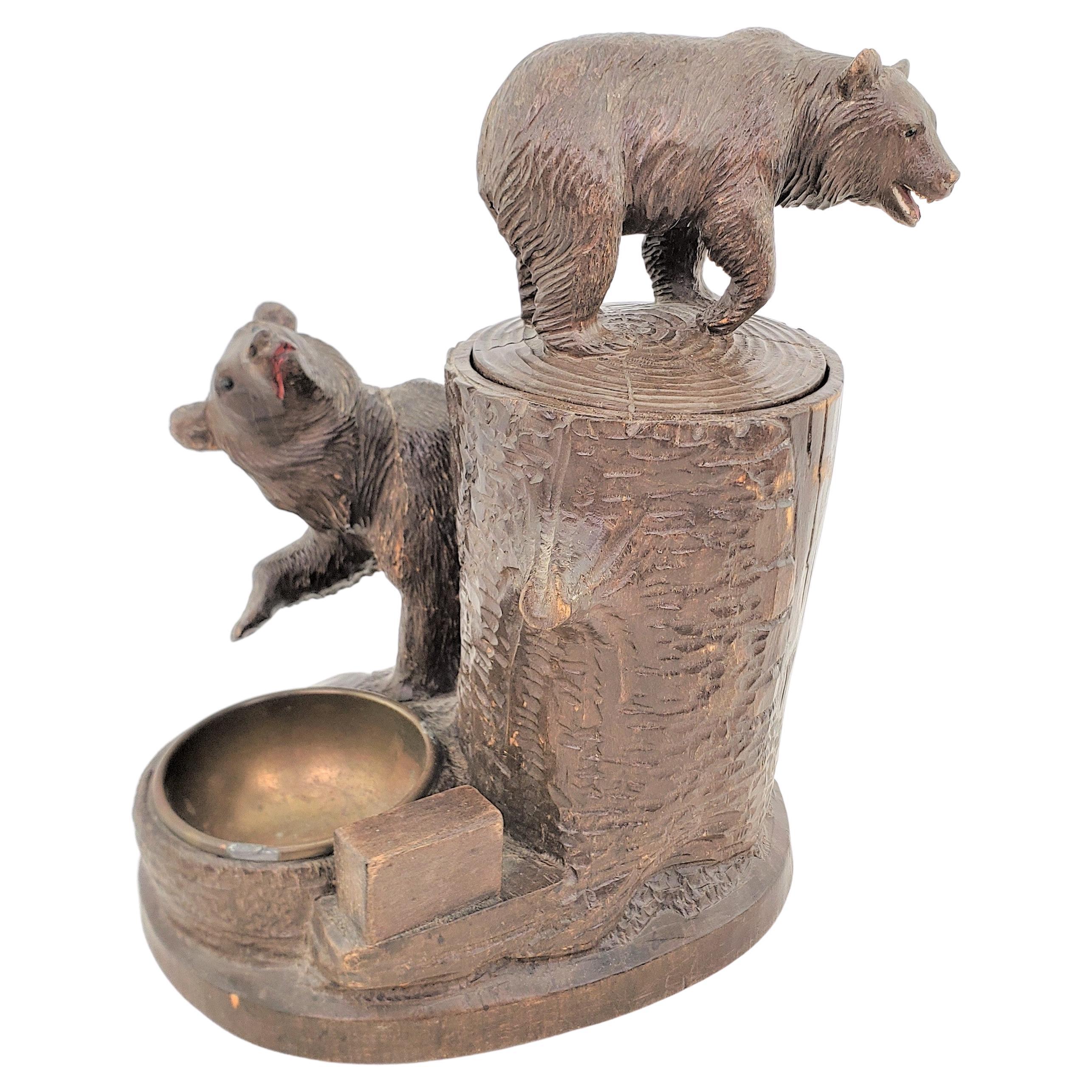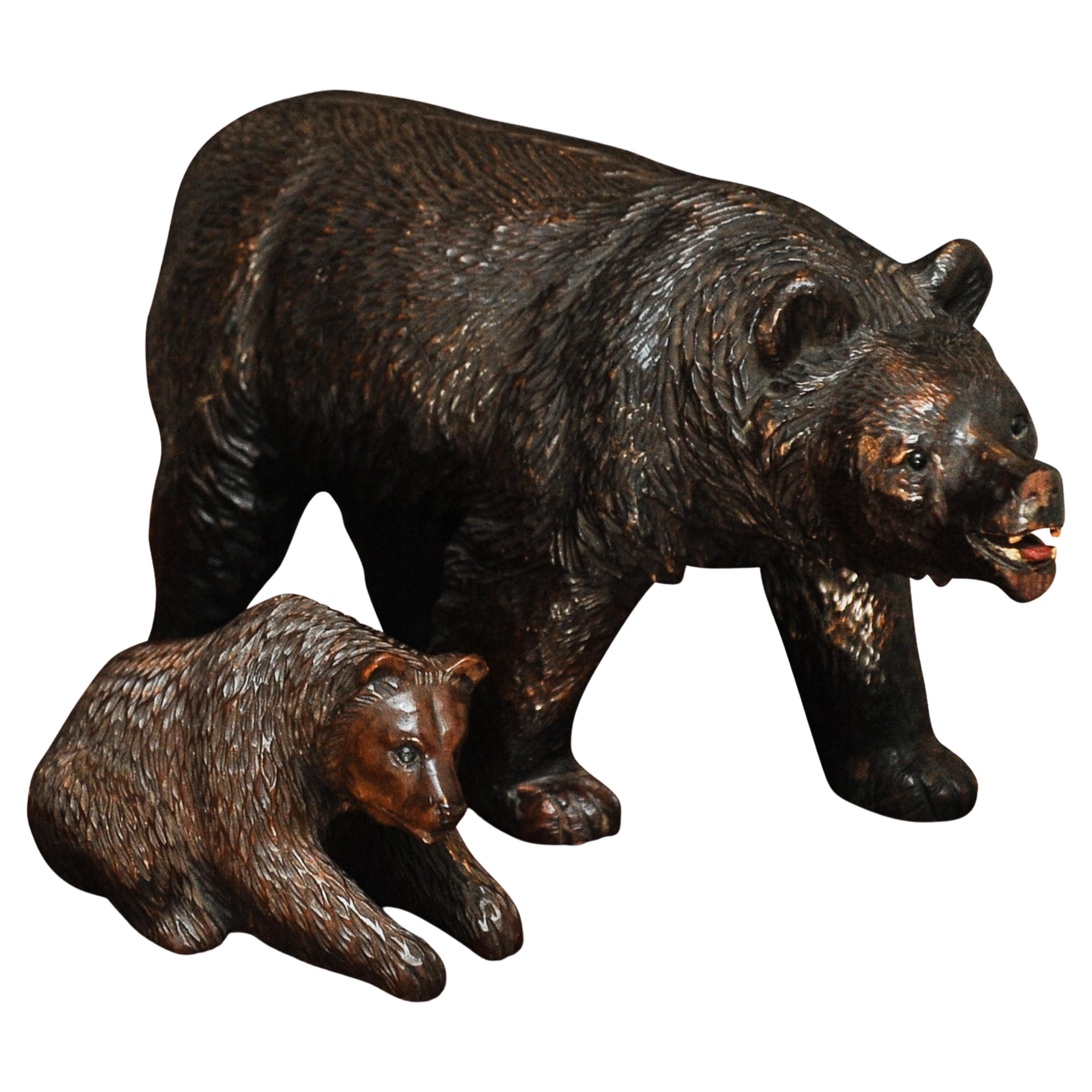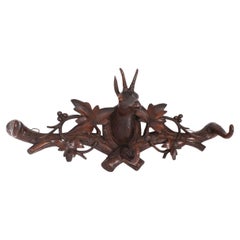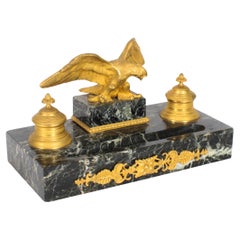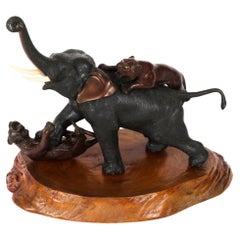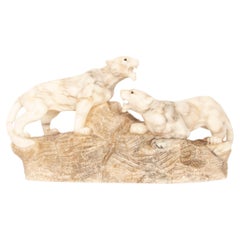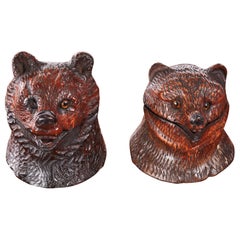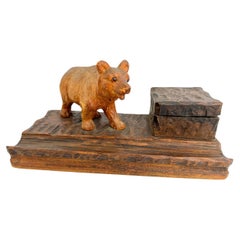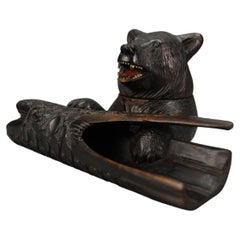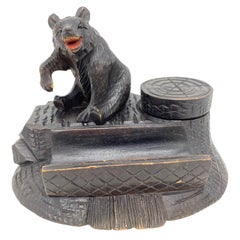Items Similar to Antique Hand Carved Black Forest Bears Inkstand 19th Century
Want more images or videos?
Request additional images or videos from the seller
1 of 11
Antique Hand Carved Black Forest Bears Inkstand 19th Century
$1,472.93
£1,075
€1,253.93
CA$2,017.54
A$2,243.95
CHF 1,171.72
MX$27,306.49
NOK 14,964.67
SEK 14,034.22
DKK 9,358.56
Shipping
Retrieving quote...The 1stDibs Promise:
Authenticity Guarantee,
Money-Back Guarantee,
24-Hour Cancellation
About the Item
This charming antique Black Forest inkstand dates from circa 1880.
Beautifully modelled, hand carved from linden wood, with mother and baby bear on a naturalistically carved rocky outcrop.
The inkwells are in the form of a pair of tree trunks with fluted glass wells with carved lids and a useful pen tray in front.
Condition:
In excellent condition. As an antique item, it shows signs of use commensurate with age, these minor condition issues are mentioned for accuracy and, as seen in the accompanying photographs, the inkstand displays beautifully.
Dimensions in cm:
Height 15 cm x Width 23 cm x Depth 14 cm
Dimensions in inches:
Height 6 inches x Width 9 inches x Depth 5 inches
History of Black Forest Carving
The idea behind the success of Brienz wood carving was quite simple. After a disastrous famine in 1816 in the Brienz area people were forced to find new areas of revenues. Driven by the need to create jobs in the Bernese Oberland, an economically underdeveloped region, the Swiss government encouraged the existing resource of timber industry to liaise with the traditional wooden craftsmanship. It took some time to improve from home requirements to sophisticated designed arts but the process was supported by the rising amount of tourists visiting the region.
Christian Fischer and other founders
Christian Fischer (1790-1848) started self-taught from simple turneries (carved bowls and other articles of daily use) to unsophisticated regional animals and people. Due to his success and the interest of the tourists, other carvers started also following his idea of carving the pristine naturalism. The Swiss government supported these start-ups with additional training of apprentices at special trade school.
Brienz School of Wood Carving
In 1884 the "School of Wood Carving, Brienz" was founded. It became an important educational institution to strengthen and develop the artistic backgrounds and exhibit an area of creativity. During the years of war in the 20th century, the demand for wooden sculptures came to rest and led to the re-orientation in areas such as toys and carvings for constructions. Beyond that the Brienz wood carving articles had to face an enormous competition from abroad. The School of Wood Carving had to get through difficult economic times but in the late 1970s wood carving enjoyed a renaissance. A lot of young people searched for elemental jobs and added a new value to school education. Today Brienz School of Wood Carving is combined with the education of turner, basket makers and coopers. The school still claims high-quality standards and follows old principles with regard to future perspectives.
Wild animals
At all times wild animals fascinate people. The highland around Brienz has large variety of different wild animals. Bears are among the most popular models for carvers. On the one hand bears are easy to cut and on the other hand they have a strong symbolized image. The enthusiasm for bears in art increased in the meantime the population endangered. One can say that hardly any other wild animal evolved from dangerous to fetish or even cute. Like the company Steiff with its Teddy bear collection, the Brienz´carvers reached inimitability.
Beyond that Brienz carvers used eagles, ibexes, chamois, deer, boars and owls frequently as models with an individual character. The Brienz School of Woodcarving even kept an own zoo with these animals to offer their students the opportunity to observe these animals on a regular basis.
Another remarkable capability of Brienz woodcarvers was their adaptability towards their customers. During the First World War several US soldiers were on R & R in the political and military neutral country of Switzerland. The American soldiers were enthusiastic about the beautiful animal sculptures and Brienz artificers started to carve local North American animals with an enormous success.
Alps´animals
Tourists were not only crazy about wild animals but they were also inspired by the typical domestic animals living in Swiss villages. Cows with their characteristic bells represent a mystery to rural life. A farm animal dedicated for production but still noticed as wild and unbroken, is an ideal illustration for artists to haunt. Goats, the headstrong all-rounder and the oldest domesticated animal, can be illustrated with great fidelity in sculptures. The St. Bernhard dog is a perfect representative of men´s.
People living in the Alps had a strong relationship to their regional living animals and it suggested itself that artists started to disguise e.g. bears. Camouflage has always been a fired artist´s imagination and license. Brienz wood carvers began to create whimsical sculptures or combinations for daily use such as a mandolin playing bear whip holder with music work integrated in the body which starts playing when something is hanged on the chamois horns.
The simple life in the Alps appealed the foreigners and encouraged artists to focus on human figures, especially hunters, poachers and shepherds. Another inspiring category were ornamental carvings of articles of daily use, such as clocks or thermometers. Since 1850 Brienz carvers started to focus on creating sculptures showing men, animals and floral motives with an outstanding and independent artist standard.
Despite of wooden sculptures Brienz carvers also created a broad range of individual furniture. The main influence to diversify in this competitive market was given by teachers from the Brienz School of Woodcarving in the late 1850s. Apart from company Gebrüder Wirth the success in standard furnishing was quite neglectable. But the Brienz carvers meet the challenge and started to develop a niche market with a significant furniture style related to Renaissance, Rococo and or Art Nouveau. They played on their strengths and combined animal carvings with furniture. The mixture of furnishings of daily use like umbrella stands with bear, dog or goose sculptures together with the bear seatings and gnome tables which were more appearance than function showed the versatility of Brienz artists. Brienz artificers created grandiose Elephant Furniture for wealthy British Indian colonists vacationing in the picturesque region around Brienz. Another high point in Brienz singularity furnishings were the so-called hall trees: a decorative perfection meeting an ingenious assembly. The majestic size of such a tree combined with the proficiency of carving and finally the whimsically look showed the uniqueness of Brienz creations.
Our reference: 09050
About the Seller
5.0
Platinum Seller
Premium sellers with a 4.7+ rating and 24-hour response times
Established in 1983
1stDibs seller since 2012
1,374 sales on 1stDibs
Typical response time: <1 hour
Associations
LAPADA - The Association of Arts & Antiques Dealers
- ShippingRetrieving quote...Shipping from: London, United Kingdom
- Return Policy
Authenticity Guarantee
In the unlikely event there’s an issue with an item’s authenticity, contact us within 1 year for a full refund. DetailsMoney-Back Guarantee
If your item is not as described, is damaged in transit, or does not arrive, contact us within 7 days for a full refund. Details24-Hour Cancellation
You have a 24-hour grace period in which to reconsider your purchase, with no questions asked.Vetted Professional Sellers
Our world-class sellers must adhere to strict standards for service and quality, maintaining the integrity of our listings.Price-Match Guarantee
If you find that a seller listed the same item for a lower price elsewhere, we’ll match it.Trusted Global Delivery
Our best-in-class carrier network provides specialized shipping options worldwide, including custom delivery.More From This Seller
View AllAntique Hand Carved Black Forest Deer's Head Hat & Coat Rack 19th Century
Located in London, GB
This is a stunning and rare Black Forest wall mounted carved deer's head hat and coat rack with glass eyes and with branch and leaf decoration,...
Category
Antique 1880s English Models and Miniatures
Materials
Wood
Antique French Ormolu & Marble Double Encrier Inkstand Standish 19th Century
Located in London, GB
This is a wonderful antique French Empire Revival ormolu mounted and patinated Verde Antico marble inkstand, Circa 1870 in date.
Of rectangular form with a pair of raised inkwells h...
Category
Antique 1870s English Empire Revival Animal Sculptures
Materials
Ormolu
Antique Large Japanese Bronze Elephant & Tigers Meiji Period 19th Century
Located in London, GB
A beautiful large Japanese Meiji Period patinated bronze study of an elephant with tigers, signed on the belly, Meiji period, 1868-1912, and late...
Category
Antique Late 19th Century Figurative Sculptures
Materials
Bronze
Antique Art Deco Alabaster Sculpture of a Pair of Lioness 20th Century
Located in London, GB
A lovely Italian antique Art Deco carved alabaster sculpture of a pair of lionesses, circa 1870 in date.
Superbly sculptured in grey veined white alabaster depicting a pair lionesse...
Category
Vintage 1920s Animal Sculptures
Materials
Marble
Antique French Ormolu & Marble Casket 19th Century
Located in London, GB
This is a fine antique French Empire Revival ormolu and patinated marble casket, circa 1820 in date.
Of rectangular form decorated with a central sculp...
Category
Antique 1820s French Empire Revival Animal Sculptures
Materials
Marble, Ormolu
Vintage Pair of Large Bronze Stag Statuettes After Moigniez, 20th Centurry
Located in London, GB
This is a handsome pair of bronze stags, bearing the replica signature of well known French sculptor Jules Moigniez, from the last quarter of the 20th century.
The stags are made ...
Category
Vintage 1980s Animal Sculptures
Materials
Marble, Bronze
You May Also Like
Pair of Antique Carved Black Forest Bear Inkwell
Located in Suffolk, GB
Pair of antique carved black forest bear inkwells with lift up lids and original glass eyes [one missing].
They are beautifully carved and a lovely co...
Category
Antique 19th Century English Inkwells
Materials
Harewood
$652 Sale Price
20% Off
Black Forest Wood Carved Bear Statue Inkwell German Antique 1900s
Located in Nuernberg, DE
Classic early 1900s black forest wood carved desktop accessory in form of a Bear. Nice addition to your room or just for use it in your writing desk. Bear made of hand carved wood an...
Category
Early 20th Century German Black Forest Sculptures and Carvings
Materials
Wood
Late 19th Century Black Forest Carved Inkwell and Pen Rest with Bear
By Brienz Switzerland
Located in Barntrup, DE
Black Forest carved inkwell and pen rest with a bear, late 19th century.
This antique, dark brown, linden wood inkwell is masterfully carved and features a detailed figure of a bear ...
Category
Antique Late 19th Century Swiss Black Forest Inkwells
Materials
Glass, Wood
Black Forest Wood Carved Brienz Bear Inkwell German Vintage, 1890s
Located in Nuernberg, DE
Classic 1890s black forest Brienz wood carved inkwell in form of a Bear. Nice addition to your room or just for use it on your desk. Made of hand carved wood and glass eyes. Found at...
Category
Antique 1890s German Black Forest Inkwells
Materials
Wood
Antique Hand-Carved Black Forest Tobacco Jar or Humidor & Ashtray with Bears
Located in Hamilton, Ontario
This antique tobacco jar or humidor is unsigned, but presumed to have originated from Austria and date to approximately 1900 and done in the perio...
Category
Early 20th Century Austrian Black Forest Tobacco Accessories
Materials
Walnut
19th Century Black Forest Bear Mother and Baby Set Hand Crafted
Located in Reading, Berkshire
Set of Two Hand Carved & Hand Painted Black Forest Bear Mother & Baby Figurines. 1800's.
Befit With Glass Beaded Eyes
Largest bear dimensions Height 16cm I Width: 30cm I Depth: 12cm
Category
Antique 19th Century Swiss Late Victorian Animal Sculptures
Materials
Wood, Glass
More Ways To Browse
Bear Antique
Black Bear Table
19th Century Trade Sign
Bear Hall Stand
Hand-Carved Wood Figures
Ornamental Sculptures
Bear Clock
Black Forest Hall Stand
Antique Wood Niche
Wood Tray Floral
Carved Deer Black Forest
Hunters Table
Art Nouveau Wood Carving
Carved Wood Faces Table
Black Floral Trays
Black Forest Carved Table
Fire Bell
British Antique Clocks
